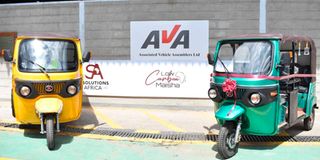
Some of the electric tuktuk (E-Beba) being introduced in the Kenyan Market by Solutions Africa Limited after they were handed over to them at the Associated Vehicle Assembler plant in Miritini, Mombasa County on June 29, 2022.
Assembly of third-wheelers, popularly known as tuk-tuk, will enjoy lower tax rates in fresh regulations published by the Cabinet Secretary for National Treasury John Mbadi.
The Tax Procedures (Unassembled Motor Vehicles, and Trailers) (Amendment) Regulations, 2024 have included cars, tuk-tuk, and trailers manufactured in the country among the vehicles to enjoy preferential tax rates in what is aimed at boosting local industry.
Currently, passenger cars and trailers, including diesel-powered and electric, assembled in Kenya are exempt from the 16 percent value-added tax (VAT) if they can achieve a local content of 30 percent.
Assemblers of all types of vehicles also enjoy a waiver of import duty (25 percent) and excise duty of 20 percent on the completely knocked-down parts they ship into the country.
The law, however, was silent on the vehicles manufactured locally, a deficiency the new amendments seek to cure.
“ ‘Manufacturer’ means a person approved by the Cabinet Secretary to manufacture a vehicle locally using parts that are locally designed and developed by an Original Equipment Manufacturer incorporated in Kenya and the value of the local inputs, is more than 50 percent of the value of the vehicle value excluding profit margin,” reads the new regulations.
This is a boost to Japan’s Toyota Tsusho Corporation which signed a framework agreement for collaboration in vehicle manufacturing and renewable energy. The agreement will see Toyota set up a vehicle manufacturing plant in the Kenya Thika vehicle manufacturers, with an initial investment of Sh800 million.
“We must have a balance between the number of imported and newly manufactured vehicles,” said President William Ruto in February last year.
Vehicles imported fully built from overseas markets attract import duty of 25 percent, exercise duty starting from 20 percent, and VAT of 16 percent, payable cumulatively and in that order.
As a condition of being exempted from VAT, the assemblers have to source parts in the local market worth at least 30 percent of the value of the motor vehicles.
The country has been encouraging the assembly of cars locally by offering tax incentives.
Some of the major assembles include Associated Vehicle Assemblers (AVA), owned by Simba Corporation, and Kenya Vehicle Manufacturers (KVM), which is a government-owned entity with involvement from CMC Motors, DT Dobie and Isuzu East Africa Limited.
The only manufacturing firm was Mobius Motors which has since shut down operations due to financial challenges, including mounting debts and a tax dispute, ending its 13-year stay in Kenya.
New vehicle dealers and assemblers reported a 2.74 percent drop in domestic sales to 11,059 units in the year ended December 2024 on the back of the deterrent high cost of borrowing that depressed circulation of in the economy, according to data from the Kenya Motor Industry Association (KMI).
The data showed that orders processed by firms such as Isuzu East Africa, CFAO Motors Kenya, and Simba Corporation fell further last year from 11,370 units in 2023.
Demand for new vehicles has declined for the third year running, with sales in 2024 the lowest reported since 2010.
The number of new three-wheelers registered has also been dropping from a high of 7,322 in 2019 to 5,760 in 2023.










